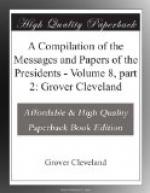In 1858 was elected city solicitor by the city council
of Cincinnati to fill a vacancy, and in the following
year was elected to the same office at a popular election,
but was defeated for reelection in 1861. After
becoming a voter he acted with the Whig party, voting
for Henry Clay in 1844, for General Taylor in 1848,
and for General Scott in 1852. Having from his
youth cherished antislavery feelings, he joined the
Republican party as soon as it was organized, and
earnestly advocated the election of Fremont in 1856
and of Lincoln in 1860. At a great mass meeting
held in Cincinnati immediately after the firing on
Fort Sumter was made chairman of a committee on resolutions.
His literary club formed a military company, of which
he was elected captain. June 7, 1861, was appointed
by the governor of Ohio major of the Twenty-third
Ohio Volunteers. September 19, 1861, was appointed
by General Rosecrans judge-advocate of the Department
of the Ohio. October 24, 1861, was promoted to
the rank of lieutenant-colonel. In the battle
of South Mountain, September 14, 1862, distinguished
himself by gallant conduct in leading a charge and
in holding a position at the head of his troops after
being severely wounded in his left arm. October
24, 1862, was appointed colonel of the Twenty-third
Ohio. In July, 1863, while with the army in southwestern
Virginia, caused an expedition of two regiments and
a section of artillery under his command to be dispatched
to Ohio for the purpose of checking the raid of the
Confederate general John Morgan, and aided materially
in preventing the raiders from recrossing the Ohio
River and in compelling Morgan to surrender. In
the spring of 1864 commanded a brigade in General
Crook’s expedition to cut the principal lines
of communication between Richmond and the Southwest.
Distinguished himself by conspicuous bravery at the
head of his brigade in storming a fortified position
on the crest of Cloyd Mountain. Commanded a brigade
in the first battle of Winchester. Took a creditable
part in the engagement at Berryville, and at the second
battle of Winchester, September 19, 1864, performed
a feat of great bravery. Leading an assault upon
a battery on an eminence, he found in his way a morass
over 50 yards wide. Being at the head of his brigade,
he plunged in first, and, his horse becoming mired
at once, he dismounted and waded across alone under
the enemy’s fire. Signaled his men to come
over, and when about 40 had joined him he rushed upon
the battery and captured it after a hand-to-hand fight.
At Fishers Hill, September 22, 1864, being then in
command of a division, executed a brilliant flank
movement over mountains and through woods, took many
pieces of artillery, and routed the enemy. At
the battle of Cedar Creek, October 19, 1864, his conduct
attracted so much attention that his commander, General
Crook, commended him, saying, “Colonel, from
this day you will be a brigadier-general.”
The commission reached him a few days afterwards.




